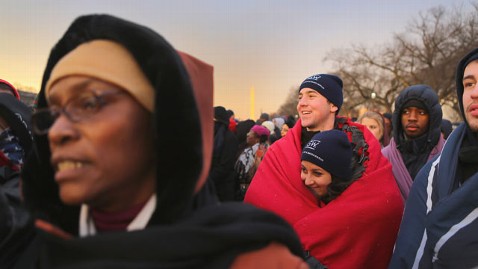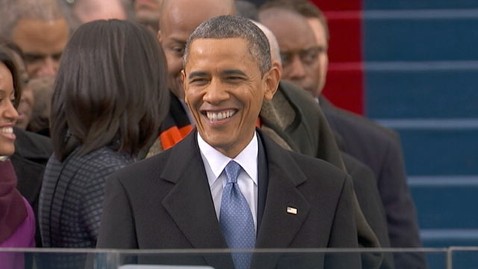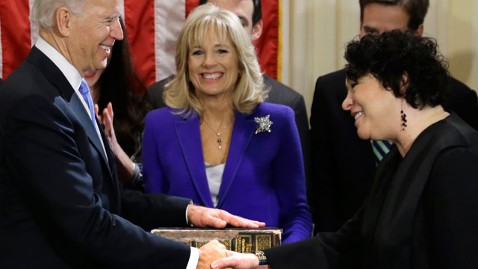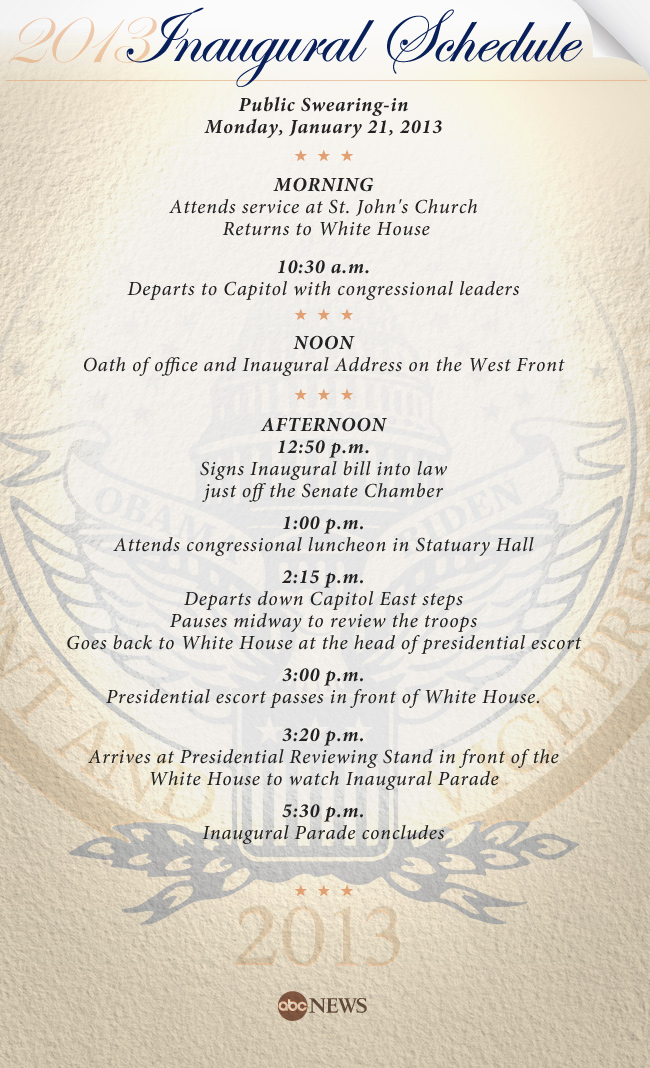Four years and one day after President Obama first took his first oath of office, America is once again celebrating his Inauguration. This time the schedule includes performances by Beyonce and Katy Perry, a parade with more than 2,000 members of the military and two Inaugural balls.
Refresh here for updates throughout the day.
Tune in to the ABC News.com Live page on Monday morning starting at 9:30 a.m. EST for all-day live streaming video coverage of Inauguration 2013: Barack Obama. Live coverage will also be available on the ABC News iPad App and mobile devices.
Read Obama’s first Inaugural address here.
All times are in Eastern Standard Time.
11:56 a.m. – Hundreds of Thousands Turn Out for Inauguration

(Image Credit: Joe Raedle/Getty Images)
As of 11:00 a.m., Washington Metro Area Transit Authority reported 308,000 people used their rail service this morning. Metro was preparing last week for an estimated 600,000 to 800,000 people to come to D.C. for the events.
In 2009, 1.8 million people gathered to welcome in Obama’s first term.
Around 11:30 a.m., the U.S. Park Police released a statement about the crowding: “The National Mall is now full and closed. All visitors not on the Mall should proceed to the overflow area at the Washington Monument.”
11:50 a.m. – Obama Takes Oath for Fourth Time

(Image Credit: ABC NEWS)
With his hand on two Bibles held by his two daughters, President Barack Obama took the inaugural oath for a fourth time. Supreme Court Chief Justice John Roberts administered the oath.
11:38 a.m. – Evers-Williams Delivers Invocation
11:33 a.m. – ABC Correspondent Tweets from Pakistan
11:30 a.m. – Ryan Congratulates Obama
ABC’s Elizabeth Hartfield reports:
No word from Mitt Romney, but his running mate, Rep. Paul Ryan sent out a congrats to President Obama.
Ryan posted a longer congratulations on his Facebook page.
I congratulate President Obama on his inauguration, and I join the country in celebrating this American tradition.
The president and I were political opponents. We had strong disagreements over the direction of the country—as we still do now. But today, we put those disagreements aside. Today, we remember what we share in common.
We serve the same country, one that is still in need of repair—and is still the freest on earth. We serve alongside men and women from both parties, who govern in good faith and good will. Finally, we serve the same people, who have honored us with their charge.
We may disagree on matters of policy. But today we remember why we take those matters so seriously—because we seek the public good. It’s our highest duty—one that we share—and one for which we’re grateful.
I’m happy to mark this historic occasion—for the president and for the country. And I look forward to tackling the big challenges ahead.
Back to top
11:20 a.m. – A Look Back at Obama’s First Inaugural Address
ABC’s Elizabeth Hartfield reports:
As Obama’s prepares to give his second inaugural address, a look back at the first: Obama’s speech in 2009 ran 2,395 words.
According to a handy word count breakdown from the Wall Street Journal, Obama used the word “people” eight times, the word “God” five times, and the word “government” four times. We can expect that those words will pop up again in today’s speech, as the president is expected to talk about unity and finding common ground among our nation’s leaders.
A word he only uttered once in 2009, that we might expect him to bring up again more this time- “war” – as the president looks back on the drawdown of America’s military presence in Iraq, and ahead to the drawdown in Afghanistan.
Today’s speech is expected to be shorter than his speech four years ago – but by how much will remain to be seen. The high bar of second inauguration speeches is Abraham Lincoln’s address in 1965- where he managed to say a lot, in just a few words- 698 to be exact.
11:16 a.m. – Obama Enters Arena
President Obama has entered the Capitol. Vice President Joe Biden and House Minority Leader Nancy Pelosi are close behind.
ABC’s Michael Falcone points out President Obama will be getting down to business shortly after he delivers his second inaugural address, officially submitting the names of his nominees for the posts of CIA Director, Secretary of Defense, Secretary of State and Secretary of the Treasury, according to a White House official.
Today, at the Capitol the President will be signing:
1. A Proclamation to commemorate the inauguration titled, “National Day of Hope and Resolve, 2013.”
2. Four Nominations:
a. John Owen Brennan to be Director of the CIA
b. Charles Timothy Hagel to be Secretary of Defense
c. John Forbes Kerry to be Secretary of State
d. Jacob J. Lew to be Secretary of the Treasury
ABC’s Devin Dwyer notes that four years ago, Obama signed a similar proclamation and nominations to the Senate. This occurs in the President’s Room, just off the Senate chamber, immediately following the address.
11:15 a.m. –
11:08 a.m. – The Biden Family Bible
A large Bible being carried in is attracting some attention for its size. The Bible belongs to the Biden family, and it’s the one Vice President Joe Biden will use to swear his oath of office, as he did four years ago.
The 120-year-old book has a Celtic cross on the front and has been passed down through the Biden clan. It is 5 inches thick, according to the Presidential Inaugural Committee.
Biden also used it Sunday in his private swearing-in ceremony at the Naval Observatory.

Carolyn Kaster/AP Photo
11:04 a.m. – Powell Slams GOP’s ‘Idiot Presentations’
ABC’s Michael Falcone reports:
In an interview with ABC’s Diane Sawyer and George Stephanopoulos during ABC’s special inauguration day coverage this morning, former Secretary of State Colin Powell lashed out at people in the Republican Party who spent the last four years spreading “birther nonsense” and other “things that demonize the president,” calling on GOP leaders to denounce such talk — publicly.
“Republicans have to stop buying into things that demonize the president. I mean, why aren’t Republican leaders shouting out about all this birther nonsense and all these other things? They should speak out. This is the kind of intolerance that I’ve been talking about where these idiot presentations continue to be made and you don’t see the senior leadership of the party say, ‘No, that’s wrong.’ In fact, sometimes by not speaking out, they’re encouraging it. And the base keeps buying the stuff.
“And it’s killing the base of the party. I mean, 26 percent favorability rating for the party right now. It ought to be telling them something. So, instead of attacking me or whoever speaks like I do, look in the mirror and realize, ‘How are we going to win the next election?”
Read more from Falcone here.
10:59 a.m. – Former President Carter Enters
Thirty-ninth President Jimmy Carter and his wife, Rosalynn, entered the Capitol to applause from the crowd. The former president shook hands and exchanged greetings with others awaiting President Obama. Carter is 88 years old and one of two former presidents expected at today’s ceremony.
The second, former President Bill Clinton, entered moments later with Sec. of State Hillary Clinton by his side.
10:56 a.m. – How to Crash a Party
Not invited to any of the official inaugural shindigs? No sweat.
ABC’s Chris Good got the scoop on how to sneak into the festivities from Fred Karger, former 2012 Republican presidential candidate and self-proclaimed party-crasher extraordinaire.
“Karger says he has crashed an inauguration party before, plus the Oscars and Fashion Week. He has fooled rope-line workers, he says, and even the Secret Service,” Good reports.
“He twice found himself onstage at the Oscars, he says, once singing the final number alongside Liza Minnelli.”
A few of Karger’s tips: call ahead under a fake name, blend in with the entourage and don’t look back. Find all of Karger’s tips and more reporting from Chris Good here.
Back to top
10:52 a.m. – Presidential Limo: Belly of the Beast
President Obama got an upgraded presidential limo when he took office four years ago.
Pierre Thomas got an exclusive look at the unveiling back then. Take a look:
Back to top
10:41 a.m. – POTUS Departs

(Image Credit: DC Vote)
President Obama has left the White House and entered his motorcade, on the way to the Capitol.
The president’s limo is sporting special plates today, in support of the D.C. statehood movement. Read more about those plates here.
Back to top
10:39 a.m. – First Lady and Vice President on Their Way
First lady Michelle Obama left the White House, followed shortly by Vice President Joe Biden.
Back to top
10:34 a.m. – Obamas Leave White House
President Obama’s daughters, Sasha and Malia, left the White House in their pink and purple coats just a moment ago. They’re headed for the Capitol, where they will watch their father take the presidential oath for the fourth time.
They were followed minutes later by a band of Marines, then by Dr. Jill Biden, Vice President Joe Biden’s wife.
Back to top
10:31 a.m. – Events Heating Up
Members of Congress can be seen streaming into the Capitol. The inaugural pre-show began at 9:30 a.m., but Sen. Chuck Schumer, D-N.Y., won’t begin introducing the president for another hour.
Across the National Mall, attendees are waving American flags, in a sea of red, white and blue.
Back to top
10:17 a.m. – Presidential Imperfections
It’s a not-so-secret understanding that even the most well-respected president’s weren’t perfect. Turns out neither were their inaugural ceremonies.
Find the funniest and quirkiest inaugural slip ups here.
Back to top
9:58 a.m. – How Do You Spell the Event of the Day?

(Image Credit: Joanna Stern / ABC News)
ABC’s Joanna Stern reports:
Nope, it’s not inaugration. Not inaguration either. Inaugiration? Not correct. And it’s definitely not innoguration or anauguration.
Inauguration. That’s the correct spelling of the word for that big event today, at which, you know, the president officially becomes the president again.
But don’t be embarrassed if you spelled it incorrectly. It turns out it’s a pretty popular thing to do.
Over 2,500 people have tweeted about the “inaguration,” according to Topsy, which tracks tweets on Twitter. Topsy says 866 of those tweets have been in the last 30 days. “Inaugration” has been used in over 700 tweets.
Read more from Stern on the many misspellings of this historic event here.
Back to top
9:42 a.m. – Obamas on the Move
The Obama family has left church services at St. John’s Episcopal Church and headed back to the White House.
To see where the president will go next, check out ABC’s interactive map here.
Pastor Andy Stanley from the North Point Community Church in Alpharetta Georgia delivered the sermon, according to pool reports, calling the president “pastor in chief.”
This tweet from the president posted while the Obama family was still in church.
Back to top
9:15 a.m. – Obama’s View
ABC’s Jonathan Karl is on the platform at the West Front of the Capitol Building where Obama will give his inaugural address later today. He’s got the best view of the crowds, which won’t come close to the 1.8 million of four years ago, but which already number hundreds of thousands.
9:11 a.m. – Members of Congress Honor MLK on Twitter
Today America remembers the legacy of another great leader: Martin Luther King, Jr. Members of the House and Senate are taking to Twitter to express their admiration for King this morning.
9:04 a.m. – On the Ground with Good Morning America.
Back to top
9:03 a.m. – Best and Worst Inaugural Addresses

(Image Credit: Getty Images)
ABC’s Chris Good reports on the best and worst inaugural speeches of all time:
Inaugural addresses, it is said, are usually not very good. Most have been long forgotten, and historians themselves point to few as memorable.
It’s not entirely clear why, but the moment might have something to do with it. Book-ending divisive national campaigns, inaugural addresses offer token unity sentiments, hopefulness but not always specific hopes, and even some good ones sound myopic.
“Most inaugural addresses are not remembered,” said Princeton University professor and noted presidential historian Eric Foner. “Grover Cleveland? I have no idea what he said in his.”
“I have actually read every single inaugural, and it was a really boring experience,” said Robert Lehrman, a former speechwriter for vice president Al Gore, who now teaches the craft at American University in Washington. “Most of the speeches are terrible. Even the ones we remember, I don’t think there is any reporter working anywhere that couldn’t write language as crisp or concrete as the majority of them.”
Read the rest of the worst and the best here.
Back to top
8:56 a.m. – Outfits of the Inauguration: Obama Style
ABC’s Mary Bruce reports:
The President, First Lady, in a dark blue jacket, and daughters Malia, in a pink overcoat, and Sasha, in dark purple, arrived just after 8:40 a.m. at St. John’s Episcopal Church for morning services.
The First Lady is wearing a navy Thom Browne coat and dress. The fabric was developed based on the style of a man’s silk tie. The belt she is wearing is from J.Crew and her earrings are designed by Cathy Waterman. She is also wearing J.Crew shoes. At the end of the Inaugural festivities, the outfit and accompanying accessories will go to the National Archives.
Malia Obama is wearing a J.Crew ensemble. Sasha Obama is wearing a Kate Spade coat and dress.
The Bidens arrived moments later.
Back to top
8:47 a.m. – Tailor to the Presidents: Republicans Dress Better
Back to top
8:45 a.m. – Great American Quotes
Inaugural addresses are an opportunity for presidents on the nation’s front lawn – a place that Americans come to in turns inaugurate their leaders, protest their government and mourn their dead – to place a marker for their legacy.
There have been some weighty and remarkable things said as presidents took the oath of office looking down on the Mall and also, from nearby, as other Americans have looked up and let their voices be heard at gatherings as varied as the March on Washington and the Promise Keepers.
What can Barack Obama say, come Monday, as he begins a second term with lower expectations and less inspiration, to place himself on this list of great American words?
Click below for an interactive look at the competition:

(Image Credit: ABC News: Ma'ayan Rosenzweig)
Back to top
8:38 a.m. – Aretha Franklin’s Hat Makes a Comeback
Back to top
8:22 a.m. – Martha Raddatz: Women Rule
Back to top
8:08 a.m. – Eva Longoria Wakes Up to with the White House

Back to top
Curated by ABC’s Z. Byron Wolf and Sarah Parnass




















